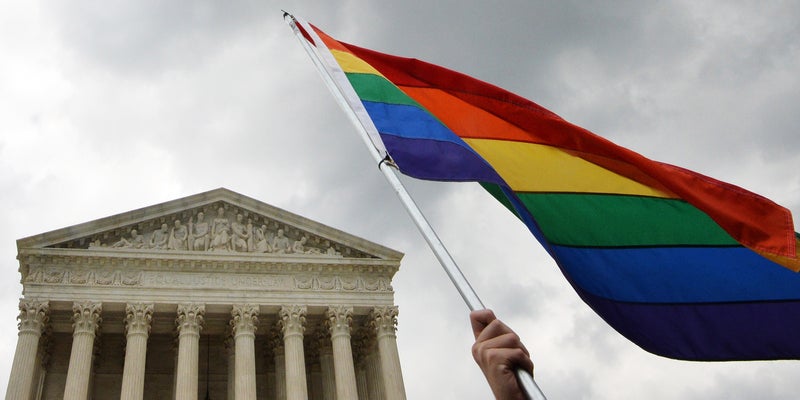Commentary: Investors’ role addressing intergenerational risk of LGBTQIA+ inequity
Investor demand for LGBTQIA+ investment options is strong and set to grow, so why is the market not responding?
Today, the proportion of the population identifying as a member of the LGBTQIA+ community is estimated to grow exponentially, with each generation nearly twice as likely as the generation preceding it to identify as LGBTQIA+, according to Gallup. However, our systems — spanning corporate human resources, education, healthcare and more — are unprepared to address this ongoing generational shift.
The exclusion of entire demographics of people from business leadership and financial services ignores the material benefits of LGBTQIA+ inclusion in the fabric of our commercial, social and civic society. LGBTQ+-led ventures received only 0.5% of the $2.1 trillion startup funding allocated in 2023, a vast underrepresentation compared with the proportion of people who identify as LGBTQ+ in the population.
Current trends indicate increasing demand for investment opportunities that drive LGBTQIA+ equity and inclusion. A 2023 report from Morgan Stanley surveyed a representative sample of individual investors in the U.S. and found nearly half of them want increased opportunities to support LGBTQ+ equity and inclusion. Younger investors demonstrate greater interest in these opportunities than older investors — with Generation Z more than twice as likely to express interest than baby boomers, and over six times more than the Silent Generation.
Yet, in 2023, a record 510 anti-LGBTQ+ bills were introduced at the state level. As a result of this type of legislation, more than half of LGBTQ+ people in the U.S. live in an area where they can be legally denied credit, a mortgage and lending services for themselves and their businesses because of their identity.
Such exclusionary practices not only prevent LGBTQIA+ individuals from fully participating in the economy, but they also pose considerable systemic risks such as reduced corporate performance, fractured social cohesion, strained resources due to limited economic mobility and weakened systems.
LGBTQIA+ inequity is an intergenerational systemic risk
As covered in Colorful Capital’s new report “Outsized Impact: How Investment Can Address the Systemic Risk of LGBTQIA+ Inequity,” exclusion and inequity translates into investors losing out on significant economic opportunity and performance.
Many studies have found that inclusive policy interventions have positive profitability and societal implications. A 2017 study on U.S.-based firms found that implementing LGBT-inclusive policies correlates with higher stock returns and higher market valuation. Building on that paper’s analysis, another group found that increases in firm-level LGBT friendliness were associated with a 7% increase in stock market valuation and 0.5% increase in profitability. In fact, LGBTQ+ workplace inclusivity has a strong correlation with increased Tobin’s Q — a measure of firm value, return on assets, and cash-flow ratios.
The financial community — encompassing financial services, corporate leaders and investment decision-makers — is uniquely positioned to leverage investor responsibility as financial stewards in advancing responsible, remunerative and equality-oriented progress. To guide their decisions and actions, investors should set goals to address LGBTQIA+ inequity at the system level, including:
- Promoting LGBTQIA+ equity at U.S. corporations and financial institutions. In 2022, more than 20% of respondents to a survey conducted by the Center for American Progress reported being fired, denied a promotion, equal wages or training opportunities because of their identity.
- Increasing access to capital for the broad LGBTQIA+ community. On average, in the U.S., LGBTQ+ adults have fewer assets and lower incomes than non-LGBTQ+ adults, according to the Federal Reserve Bank of St. Louis.
- Improving wealth-generating financial outcomes for LGBTQIA+ founders. A 2022 study that appeared in the Research in International Business and Finance journal posted via ScienceDirect found that stocks led by LGBTQ+ CEOs significantly outperformed the market by a monthly alpha of 0.69% to 1.08% in both raw and risk-adjusted terms. Yet, LGBTQ+-led ventures received only 0.5% of the $2.1 trillion startup funding allocated in 2023.
- Contributing to the development of LGBTQIA+-equitable social structures. CAP summarized from its 2022 survey: “LGBTQI+ individuals continue to experience significantly higher rates of discrimination than non-LGBTQI+ individuals, a trend that holds true in virtually every setting surveyed — including health care, employment, housing, and public spaces.”
- Driving financial inclusion to spur economic growth and social cohesion. Increasing the inclusion of LGBTQ+ people within the economy can increase a country’s gross domestic product by 1% or more.
- Improving data capture and infrastructure related to dimensions of LGBTQIA+ progress. Currently, the census and American Community Survey only collect data on married or cohabiting same-sex couples — meaning that single LGBTQ+ individuals are excluded from the dataset.
The financial community must recognize and invest in the resilience, potential and achievement of LGBTQIA+ business leaders and innovators. When we dismantle the socially and systemically enforced closet that marginalizes the LGBTQ+ community, we will catalyze social and economic prosperity.
Read more @pionline











